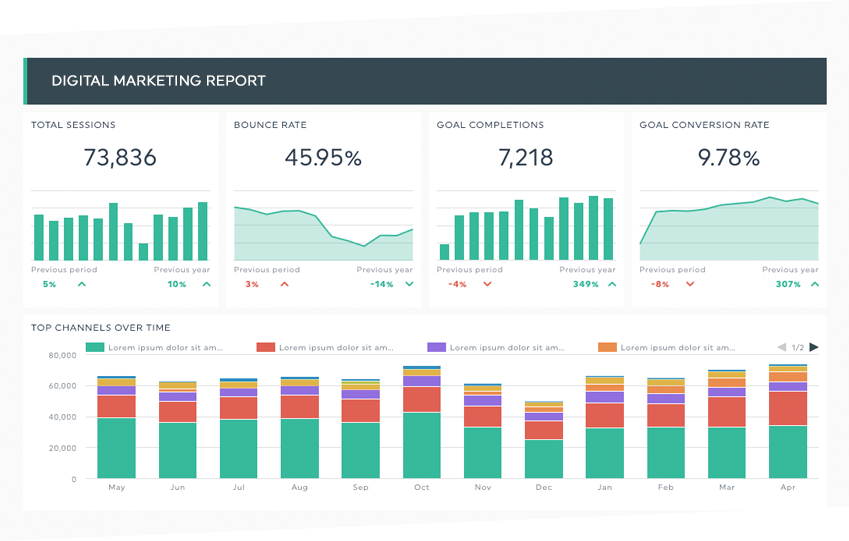How to choose the important Digital Marketing KPIs (2024)
Digital marketing is getting more vast and complex every single day; there are always new tools, websites, types of ads and content available. With all these digital marketing possibilities comes a plethora of data you need to keep track of for each of your digital marketing campaigns. It can become quite overwhelming if you don’t know which Key Performance Indicators (KPIs) to track.
Quick Links
Digital marketers find themselves in a dilemma. On the one hand, there is too much information from platforms such as Google Analytics or for specific Advertising Campaigns in Google Ads – more often than not this information is buried in reports that are hard to read and interpret (sorry GA4, but it’s true). However, questions like the degree of brand awareness, the true customer acquisition cost or even the customer lifetime value are more difficult to answer. What is the best way to track a new customer coming from the search engines so that your sales team can understand and act on data about their target audience?
First step: Determine your goals
Even with the best strategy, you still need to track the right KPIs to know if your efforts are working as expected and to steer them in the right direction if they’re not. To do so, you first need to go back to your goals.
The important KPIs for your digital marketing are the ones that will give you the best insight into your goals and that give you a measurable value that you can track as digital marketing metrics.
So the first step is to determine what your goals are. Make sure the goals in question are SMART (Specific, Measurable, Achievable, Realistic, and Timely). With your goal in mind, just ask yourself: How can I achieve this?
Let’s say that your goal is to increase e-commerce sales by 10% before the end of the year. You might do campaigns to bring more qualified traffic, and in that case, you should check KPIs such as Number of sales, Conversion rate, overall website traffic, Cost-per-click, Open Rates, etc. These are all KPIs that could play a role in how you will achieve this goal.
Second step: Choose relevant KPIs
Now that you have your goal in mind, and have an idea of the kind of metrics you should track. Make sure you’re only tracking the most relevant KPIs.
It might be tempting however to track as much data as possible, even data that isn’t necessarily related to your goals. This type of data is called vanity metrics, and even though it might look great to track your number of likes, followers, or traffic, if your goal isn’t to improve those things, it’s irrelevant to track them.
Tracking vanity metrics will most likely result in a marketing report that’s too crowded and that doesn’t show your results as clearly as it should.
So make sure to track only relevant KPIs for your goals.
Here are some examples of KPIs you could track for each type of goal:
Website traffic:
- Organic traffic vs paid traffic
- Bounce rate
- Page views
- Pages per visit
- Visit by channel or device
- Unique visitors
- New vs. returning visitors
Conversions:
- Organic conversions
- Conversion rate
- Number of conversions
- Conversion value
- Cost per acquisition (CPA)
Clicks:
- Clicks
- Cost Per Click (CPC) per advertising campaign
- Click-Through Rate (CTR)
Revenues:
- Return On Ad Spend (ROAS)
- Return on investment (ROI)
- Revenue Share (RPC)
Social media reach and engagement:
- Performance of different social media platforms
- Page & post likes
- Followers
- Impressions
- Social share
- Comments
- Clicks
- Engagement rate
Email Marketing
- Open rates
- Click through rates
- Clicks on different landing pages
- Unsubscribe rates
Search Engine Optimization
- Organic traffic
- Performance of specific web pages
- Keyword ranking
- Positioning in the search results compared to the competition
Third step: Track your KPIs
Last but not least, you need to track these KPIs regularly. This is a critical part of the digital marketing strategy – building easy-to-update and easy-to-understand reports that show the key metrics is essential.
For most digital campaigns, you should track your performance with monthly reports, this will give you enough data to really be able to use it and act on it, while not taking too long so that you wouldn’t be able to react quickly enough if your campaigns aren’t going in the right direction. For some types of campaigns, you could also track your data weekly or daily, to really keep a close eye on what’s going on and allow you to take the desired action for your business model .
There are many ways for you to track your KPIs, some marketers will use Excel spreadsheets, others will use PowerPoint presentations, and you can also build automated reports in Looker Studio (formally known as Google Data Studio) which can be shared or sent by email periodically, it all depends on your needs. You can also use an automated digital marketing reporting tool to keep track of your KPIs without the hassle of gathering all your data every month. It’s a particularly useful tool if you need to keep track of a lot of different KPIs or if you are an agency with multiple different reports to produce.
You’re all set!
Now that you know all the steps necessary to track the most important KPIs for your digital marketing performance, all that’s left to do is create amazing digital marketing strategies, and let your results guide you to take the desired actions to increase the number of qualified leads, your potential customers, customer satisfaction – move a larger number of people through your sales funnel. Basically the reports should lead you to increase the success of your marketing campaigns
To help you out, here’s a quick guide on how to choose the right digital marketing KPIs for all your digital marketing efforts.

Bio:
Marie Lamonde is a content marketing specialist at DashThis, a marketing reporting tool. She can never stop writing about her favourite topics; digital marketing, SEO, and reporting.
What Is WooCommerce Product Slider and Why Your Store Needs It
Why Do Product Images Matter So Much in Online Stores? When someone visits an online store the…
0 Comments9 Minutes
How to Streamline Your Customers’ Shopping Experience?
The goal for any online store is to make shopping as smooth as possible. When visitors move…
0 Comments8 Minutes
Strengthening Brand-Customer Relationships Through Gamified Loyalty Programs
Creating lasting connections with customers has become increasingly vital as the marketplace grows…
0 Comments6 Minutes
How to Use SEO and SEA Together in Search Engine Marketing
In digital marketing, search engine marketing (SEM) plays a critical role in improving online…
0 Comments10 Minutes
Content Marketing Growth Hacks: Real Shortcuts to Drive Traffic
Are you still lagging in content marketing? Sticking to these old strategies seems…
0 Comments10 Minutes
How to Build a Strong Local Following Using Social Media Marketing
In the days of likes, shares, and stories, local businesses have a golden opportunity to create…
0 Comments9 Minutes
Why WooCommerce is the Best Choice for Your Online Store?
WooCommerce stands out as a top option for anyone looking to build an online store. This platform…
0 Comments8 Minutes
How to Use AI-Powered SEO Tools for WordPress eCommerce
SEO is a critical factor in the success of any e-commerce WordPress store. As competition…
0 Comments11 Minutes








